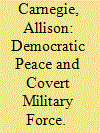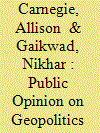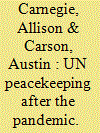| Srl | Item |
| 1 |
ID:
189007


|
|
|
|
|
| Summary/Abstract |
How should we reconcile covert war with normative theories of the democratic peace? Proponents argue that these interventions are consistent with democratic peace theory, as leaders intervene covertly to escape backlash by a public that has internalized liberal norms. Yet we know little about public opinion regarding the covert use of force. Using a survey experiment, we find that respondents are more favorable towards covert interventions against democratic targets than our theories assume, and that even citizens who value transparency the most still wrestle with a trade-off between their normative commitments and the instrumental benefits they perceive covert actions to hold. Our results thus help to explain why American leaders have repeatedly chosen to conduct covert military operations against fellow democracies, and raise important questions about the scope conditions of normative theories of the democratic peace.
|
|
|
|
|
|
|
|
|
|
|
|
|
|
|
|
| 2 |
ID:
175817


|
|
|
|
|
| Summary/Abstract |
Do peacekeepers protect civilians in civil conflict? Securing civilian safety is a key objective of contemporary peacekeeping missions, yet whether these efforts actually make a difference on the ground is widely debated in large part because of intractable endogeneity concerns and selection bias. To overcome these issues, we use an instrumental variables design, leveraging exogenous variation in the rotation of African members of the United Nations Security Council and looking at its effects on African civil wars. We show that states that wield more power send more peacekeepers to their preferred locations, and that these peacekeepers in turn help to protect civilians. We thus demonstrate the robustness of many existing results to a plausible identification strategy and present a method that can also be applied to other diverse settings in international relations.
|
|
|
|
|
|
|
|
|
|
|
|
|
|
|
|
| 3 |
ID:
185603


|
|
|
|
|
| Summary/Abstract |
This article provides a systematic examination of the role of security considerations in shaping mass preferences over international economic exchange. The authors employ multiple survey experiments conducted in the United States and India, along with observational and case study evidence, to investigate how geopolitics affects voters’ views of international trade. Their research shows that respondents consistently—and by large margins—prefer trading with allies over adversaries. Negative prior beliefs about adversaries, amplified by concerns that trade will bolster the partner's military, account for this preference. Yet the authors also find that a significant proportion of the public believes that trade can lead to peace and that the peace-inducing aspects of trade can cause voters to overcome their aversion to trade with adversaries. This article helps explain when and why governments constrained by public opinion pursue economic cooperation in the shadow of conflict.
|
|
|
|
|
|
|
|
|
|
|
|
|
|
|
|
| 4 |
ID:
160512


|
|
|
|
|
| Summary/Abstract |
How does publicizing states' illicit activities affect the stability of international order? What does this relationship tell us about how governments react to violations of international rules? In contrast to the conventional wisdom that transparent monitoring strengthens the normative legal order, we argue that these activities often undermine it. We develop two mechanisms through which this occurs: by raising the known rate of noncompliance, and by sharpening the threat that deviance poses to other states. We argue that when enforcers understand the dangers of publicizing transgressions, they do so selectively. Focusing on the nuclear nonproliferation domain, we demonstrate that these concerns shaped American decisions to reveal or obfuscate other states' efforts to obtain nuclear weapons. We formalize this argument and then empirically test the model's predictions using in-depth case study analyses. We find that the US failed to disclose infractions when this publicity would have undermined the rules through the two mechanisms we identify. However, while concealing violations can prevent proliferation in response to specific nuclear programs, it can also create potential dangers to a regime's overall health and stability. In addition to reassessing a widely shared assumption about the value of transparent monitoring, this article's broad theoretical framework can shed light on enforcement and compliance dynamics in a variety of international settings.
|
|
|
|
|
|
|
|
|
|
|
|
|
|
|
|
| 5 |
ID:
131497


|
|
|
|
|
| Publication |
2014.
|
| Summary/Abstract |
This paper argues that the benefits of international institutions accrue disproportionately to pairs of states that find cooperation most difficult. It determines which states achieve the greatest gains from these institutions by identifying a central reason that states fail to cooperate in international relations: they fear being "held up" by other states for political concessions. Political hold-up problems occur when one state fails to undertake an otherwise productive investment due to the increased ability it would give another state to extract political concessions. Focusing on the World Trade Organization (WTO), I demonstrate that political hold-up problems are pervasive in international relations due to links between economic and political policies, but that international institutions can solve hold-up problems by helping to enforce agreements. I first formalize this argument and then empirically test the implications derived from the model, finding that the WTO increases trade most for politically dissimilar states by reducing states' abilities to hold up their trading partners for foreign policy concessions. I provide evidence of the causal mechanism by showing that WTO membership increases trade in contract-intensive goods and boosts fixed capital investment. I conclude that by solving political hold-up problems, international institutions can normalize relations between politically asymmetric states that differ in terms of capabilities, regime types, and alliances.
|
|
|
|
|
|
|
|
|
|
|
|
|
|
|
|
| 6 |
ID:
178967


|
|
|
|
|
| Summary/Abstract |
Increasing peacekeepers’ access to information derived from intelligence sources could help compensate for their reduced physical presence due to COVID-19.
|
|
|
|
|
|
|
|
|
|
|
|
|
|
|
|